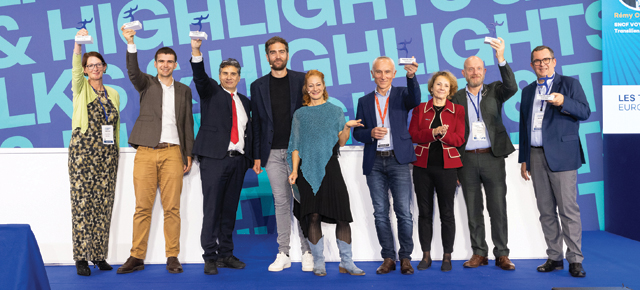The European Mobility Expo revealed that our continental neighbours face similar challenges
Fiona Guthrie (left) and fellow Talent in Mobility winners
If you like trams you’ll LOVE Strasbourg. With a population of 860,000 across the conurbation, France’s eighth largest city is criss-crossed by multiple light rail and BRT lines. Visitors from UK cities can’t avoid wondering what might have been if our leaders had shown similar vision and boldness.
The city was selected as the venue for the eleventh edition of European Mobility Expo (EuMo Expo), which was held on October 1-3 and attracted 11,000 visitors. The event’s traditional venue is Paris but the show’s organisers wanted to sidestep any potential issues with hosting major events in the Paris region in the wake of the Olympic and Paralympic Games. Strasbourg was regarded as the obvious choice.
Speaking in the run-up to the show, Louis Nègre, president of the group which represents France’s transport authorities (GART) hailed the city as “a real showcase for public transport”.
The transport network [in Strasbourg] is among the best in France and a source of inspiration for professionals both nationally and across Europe as a whole
“The transport network there is among the best in France and a source of inspiration for professionals both nationally and across Europe as a whole,” he said.
This is a pan-European show with a distinctly French flavour. As you might expect, decarbonisation was a major talking point – and the exhibition featured many electric buses and associated technology. Excluding the populous Île-de-France region, the French equivalent of Greater London, the French Senate has estimated that transport authorities need some €60bn (£50bn) between now and 2030 to decarbonise their transport networks.
While new investments can be partly financed by loans, GART supports the idea that urban and regional mobility authorities should benefit from additional resources to ensure their mobility policies are financially sustainable.Public transport in France is still structurally fragile and struggles to obtain funding from national government, and GART recognises the need explore innovative funding solutions. Options include reallocating some of the tax revenue from road transport to mobility.
French national government now needs to ensure the sustainability of the business models of all mobility operators outside Île-de-France … as a matter of urgency
Nègre warned: “French national government now needs to ensure the sustainability of the business models of all mobility operators outside Île-de-France (be they urban, regional, metropolitan or in France’s overseas departments and territories) as a matter of urgency.
The show’s final day saw Nègre given the chance to quiz French transport minister François Durovray. The hour-long the session was genial, but the core message from the minister was uncompromising: creativity and collaborative working will be required to maintain and improve transport systems because there is little or no scope to increase funding from the government.
Another major talking point at the show was French ambitions for the ‘single ticket system’. It means everyone can access mobility offerings without having to cope with a plethora of different tickets specific to each transport network. The idea is just one of GART’s proposals for the 2022-2027 French presidential mandate, now taken up by national government and entering the experimental phase. This innovation is gradually taking shape and will start to become a reality on French transport networks in the coming months. In July, Syndicat des mobilités de Touraine, which provides transport services in a region surrounding the city of Tours, became the first mobility authority to sign the single ticket experiment agreement.
Whether its greater collaboration or innovation, it all hangs on the talents of those working in the transport sector – and the biennial Talent in Mobility awards seek to honour women and men who are playing their part in developing public transport and sustainable mobility across Europe. A jury of journalists from the European trade press, including Passenger Transport editor Robert Jack chooses the winners.
Among this year’s winners was Fiona Guthrie, HR director and deputy managing director at RATP Dev Transit London. Guthrie was named joint winner of the Best Project Manager award after running the ‘Garage Life’ programme, an innovative training initiative for bus drivers that significantly reduced dropout rates by creating a greater sense of comradeship in the workplace.
The challenge of recruiting and retaining staff for public transport operations is one that is shared across Europe and the jury were impressed by this straightforward but effective initiative.
This article appears in the latest issue of Passenger Transport.
DON’T MISS OUT – GET YOUR COPY! – click here to subscribe!
The post Big challenges, tight budgets first appeared on Passenger Transport.

